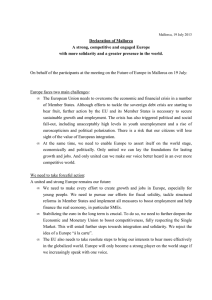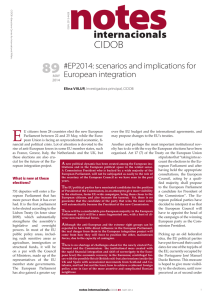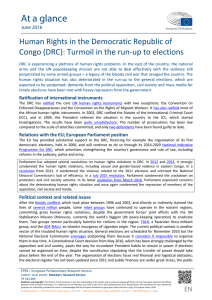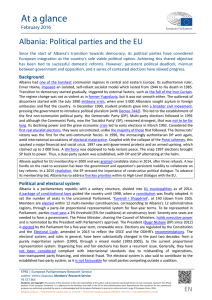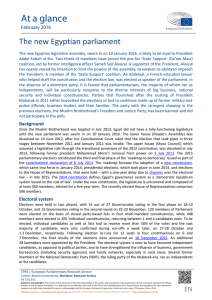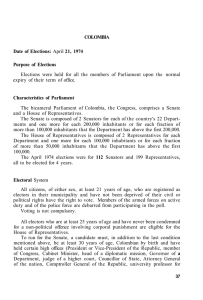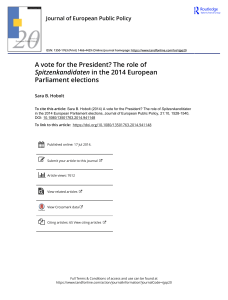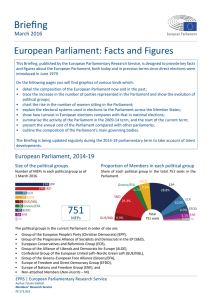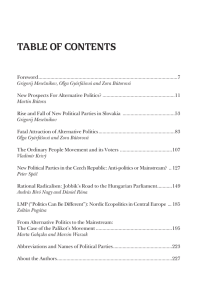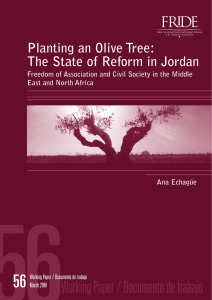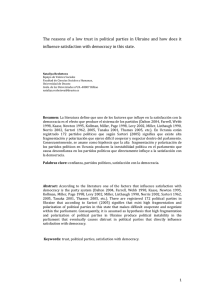Interview given by the President of the European Parliament, Hans
Anuncio
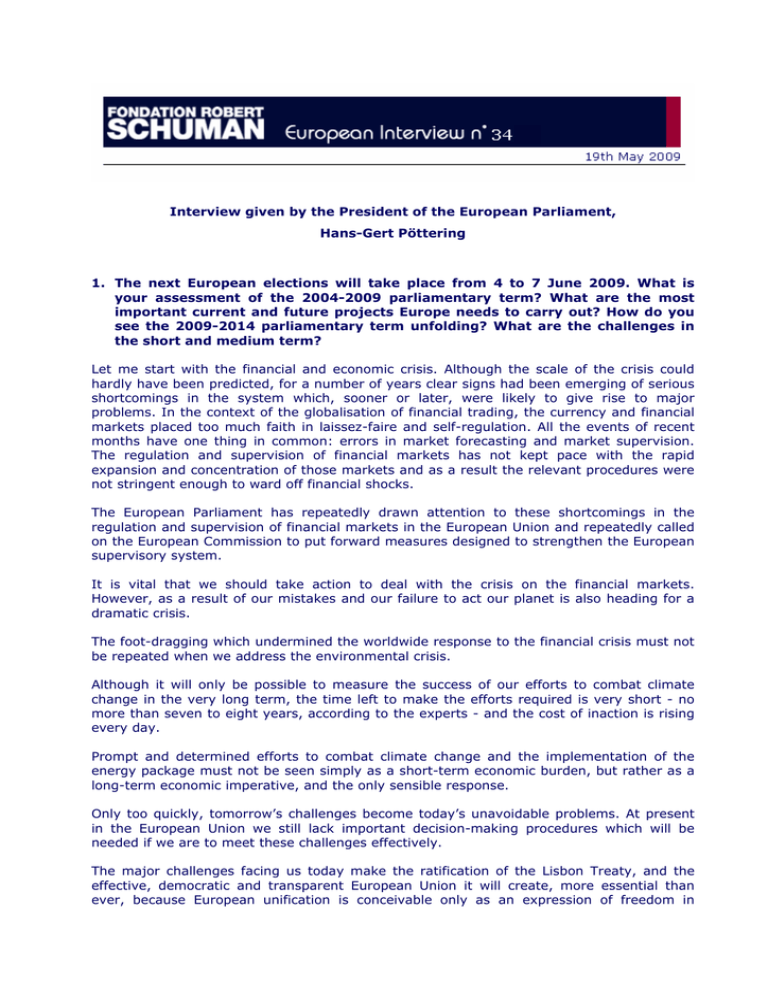
Interview given by the President of the European Parliament, Hans-Gert Pöttering 1. The next European elections will take place from 4 to 7 June 2009. What is your assessment of the 2004-2009 parliamentary term? What are the most important current and future projects Europe needs to carry out? How do you see the 2009-2014 parliamentary term unfolding? What are the challenges in the short and medium term? Let me start with the financial and economic crisis. Although the scale of the crisis could hardly have been predicted, for a number of years clear signs had been emerging of serious shortcomings in the system which, sooner or later, were likely to give rise to major problems. In the context of the globalisation of financial trading, the currency and financial markets placed too much faith in laissez-faire and self-regulation. All the events of recent months have one thing in common: errors in market forecasting and market supervision. The regulation and supervision of financial markets has not kept pace with the rapid expansion and concentration of those markets and as a result the relevant procedures were not stringent enough to ward off financial shocks. The European Parliament has repeatedly drawn attention to these shortcomings in the regulation and supervision of financial markets in the European Union and repeatedly called on the European Commission to put forward measures designed to strengthen the European supervisory system. It is vital that we should take action to deal with the crisis on the financial markets. However, as a result of our mistakes and our failure to act our planet is also heading for a dramatic crisis. The foot-dragging which undermined the worldwide response to the financial crisis must not be repeated when we address the environmental crisis. Although it will only be possible to measure the success of our efforts to combat climate change in the very long term, the time left to make the efforts required is very short - no more than seven to eight years, according to the experts - and the cost of inaction is rising every day. Prompt and determined efforts to combat climate change and the implementation of the energy package must not be seen simply as a short-term economic burden, but rather as a long-term economic imperative, and the only sensible response. Only too quickly, tomorrow’s challenges become today’s unavoidable problems. At present in the European Union we still lack important decision-making procedures which will be needed if we are to meet these challenges effectively. The major challenges facing us today make the ratification of the Lisbon Treaty, and the effective, democratic and transparent European Union it will create, more essential than ever, because European unification is conceivable only as an expression of freedom in Europe. We must safeguard human rights, democracy and our legal order by developing the Union further as a community of law and freedom. Without human rights, democracy and laws there can be no trust between States and between people in society. We must continue our efforts to ensure that the law always has primacy in Europe. Our watchword must be right before might, not might before right! A further key challenge concerns intercultural dialogue. The dialogue between cultures advocated in the European Parliament as a means of preventing a clash of civilisations has been warmly welcomed in the Member States and among our neighbours. The institutions of the European Union are taking this dialogue increasingly seriously and organising a series of initiatives and events – to give just one example, 2008 was declared European Year of Intercultural Dialogue. More and more aspects of global life which call for political decisions are no longer matters of national sovereignty. We are facing major challenges which transcend national borders. For that reason, effective cooperation between decision-makers at national and European levels is vital if viable and effective solutions are to be developed which benefit everyone in the European Union. If democracy is to be strengthened, it is essential that the European Parliament should play its role as co-legislator actively and self-confidently. It is equally essential, however, that the national parliaments should play much closer attention to basic issues and to the nuts and bolts of European policies. The European Parliament and the national parliaments are not competitors; rather they have a shared responsibility towards European democracy. Nor should we forget the important role played by regional democracy – in Germany, the federal Länder - and democracy at local level in the towns, municipalities and districts which constitute Europe’s wealth and its diversity in unity. Today, when we look at the way influence and power are exercised and politics is conducted in the European Union, it is clear that by and large proper account is taken of the European Parliament, in terms of its responsibilities and status and the respect in which it is held, in the system of European parliamentary democracy. 2. What is your personal assessment of your Presidency? There are good reasons why the term of office of the President of the European Parliament is limited to two-and-a-half years. We are the parliament of all the citizens of the European Union. We embody our continent’s unity in diversity. More than the other EU institutions, we must regularly account for our actions. MEPs stand in free elections. We know that power changing hands strengthens democracy, and the same applies to the office of President of the European Parliament. I chose two principles to guide my actions as President of the European Parliament, principles which will of course remain valid beyond the end of my term of office: the unconditional protection of human dignity and the importance of intercultural dialogue. I have repeatedly made my views on these two issues clear. We have taken some measures together. I look back on the Year of Intercultural Dialogue with particular feelings of gratitude, since it lent fresh impetus to our efforts and that impetus will continue in the future to guide us, inspire us and remind us of the commitment we have made. In my inaugural speech as President of the European Parliament I called for the establishment of a ‘House of European History’ as a place of remembrance in which we can renew our sense of European identity. Since then, the groundwork has been laid and I hope that the ‘House of European History’ will open its doors in time for the 2014 elections. 2 3. It is striking that whilst the European Parliament’s powers and responsibilities are increasing, voter turnout in the European elections is falling. How do you explain this paradox? In your view, how can we encourage people to take an interest in these elections and in an institution – the European Parliament – which is playing an increasingly important role in the EU political system? One thing emerges very clearly from my discussions with voters – interest in European Union policies is as great as ever. However, the people I talk to repeatedly complain about a lack of information about the European Union and its work. Many members of the public seem to be completely unaware that the European Parliament has the powers you refer to. This information deficit is repeatedly confirmed by the results of the annual Eurobarometer surveys. We must take this problem very seriously, because people who are not properly informed find it very difficult to take political decisions. It is precisely for that reason that supporters of the ‘No’ campaign during the Irish referendum came up with the slogan ‘If you don’t know vote no’. Providing ordinary members of the public with better information must therefore be central to any second referendum campaign in Ireland. This of course raises the question of the reason for this information deficit, since all the European institutions make every effort to keep the public informed in a wide variety of ways, whether by channelling information directly to the media or by means of public events, visitor programmes or direct contact with members of the public via the Internet and new media. One important reason is certainly the lack of a European public forum for debate. For example, reports on political developments in the European Union are disseminated through the national media in the Member States. And what is true for European politicians is also true for the European correspondents who report from Brussels and Strasbourg. Their reports are always in competition with, and often take second place to, coverage of national events. It is also regrettable that television current affairs and discussion programmes on topics which also have a European dimension, such as immigration, the financial crisis, the internal market or security, only issue invitations to national politicians. Ideally, politicians active at EU level should also be asked to take part and offer a European viewpoint on these issues. The result is that the participants in these discussions lack in-depth, specialist knowledge of European policies. It should be obvious just how difficult it is to convey ideas about European democracy without Europe-wide media support. Support from national politicians, governments and MPs for the European Union's key political aims is therefore essential to securing more extensive media coverage of European issues in the Member States. 4. How do you see the forthcoming European elections unfolding? What steps can be taken to ensure that voters do not confuse national considerations with the genuinely European issues at stake in these elections? From a purely national point of view as well, the importance of the European Parliament elections should not be underestimated if they are the first in a series of polls and thus serve as a test for national elections. Germany illustrates this point well. Only 16 weeks after the European Parliament elections, German voters will elect the new Bundestag. The Bundestag election is traditionally regarded as the high point in the German electoral calendar. In 2009, this calendar is particularly full, with the election of the federal President on 23 May and eleven local and Landtag elections, so that the year promises to be an exciting one. For that reason, success in the European elections can set the tone for good performances in the elections at federal, Land and local levels. In addition, in the run-up to European elections in particular we always see an upsurge in people's knowledge and understanding of European Union affairs, as a direct result of the election campaign. What is more, the most recent EUROBAROMETER surveys show that the public very much approve of the role played by the European Union at times of crisis in particular: almost two-thirds of Europeans are calling for the European Union to be given a greater say in decisions taken 3 with a view to addressing the financial and economic crisis. In this respect, the European Union is seen as a more likely source of solutions than the Member States. 5. The European elections will be held on the basis of the Treaty of Nice, but the 2009-2014 parliamentary term could be governed by the rules laid down in the Lisbon Treaty. For that reason, many commentators are suggesting that the President of the European Commission should be appointed on the basis of the provisions of the Lisbon Treaty, i.e. taking account of the results of the European elections. Do you support these calls? Do you not think that such an arrangement might stimulate genuine public interest in the European elections in June? In 2004, Parliament already secured acceptance for its proposal that the political affiliation of the Commission President should reflect the outcome of the European Parliament elections. It will be no different when the new Commission President is chosen after the 2009 European elections. A victory for the European People's Party (EPP) and its partners will enable José Manuel Durão Barroso to continue his successful work as Commission President. The reform Treaty will give legal force to what is a fundamental entitlement of a democratically elected Parliament: following the entry into force of the Lisbon Treaty, in future when putting forward a nominee for the post of Commission President the Heads of State and Government will be required to take account of the results of the European Parliament elections. Under the reform Treaty, the European Parliament will elect the President of the Commission and, in a further vote, express its confidence, or lack of confidence, in the Commission as a whole. The European Parliament's powers in connection with the appointment of the Commission are thus more comprehensive than those of the German Bundestag, which elects the federal Chancellor, but does not give a vote of confidence to the federal government as a whole. Publishing Director : Pascale Joannin The Robert Schuman Foundation, created in 1991 and acknowledged by State decree in 1992, is the main French research centre on Europe. It develops research on the European Union and its policies and promotes the content of these in France, Europe and abroad. It encourages, enriches and stimulates European debate thanks to its research, publications and the organisation of conferences. The Foundation is presided over by Mr. Jean-Dominique Giuliani. 4
